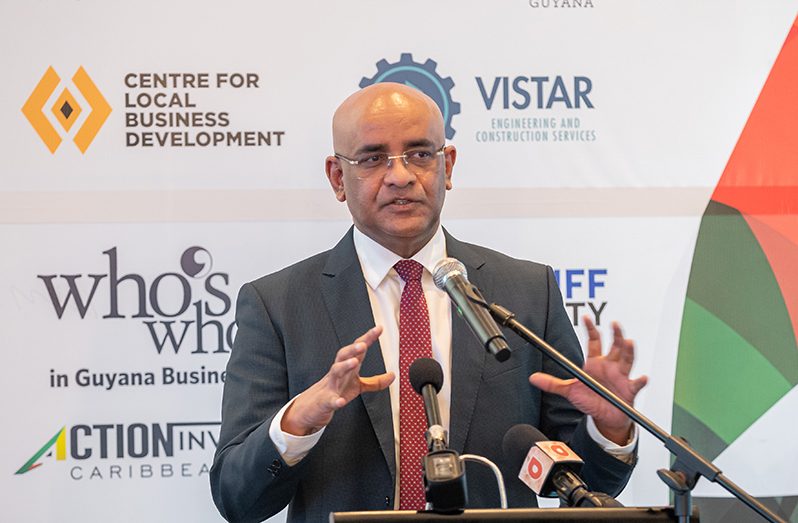–Local Content Summit sparks discussion on anticipated review of Local Content Legislation
–VP Jagdeo maintains that a balance will be pursued to ensure that no stakeholder is discouraged
CONVERSATIONS on local content success stories by local businesses, and how local content has managed to foster economic growth during the inaugural Local Content Summit at the Pegasus Suites on Tuesday made for a vibrant start to discussions on the reform of Guyana’s Local Content Legislation.
Held under the theme, “Sustaining Supplier Development through Local Content Partnership”, the summit was designed to facilitate knowledge exchange for Guyanese small enterprises interested in working in the energy sector.
The summit was hosted by MBW Energy Support Services Inc., headed by Chief Executive Officer Abbigale Loncke-Watson.
Delivering the keynote address at the event, Vice-President Dr. Bharrat Jagdeo said the occasion was a springboard for discussions on policies and certification, and to review the impact of the legislation.
“We decided to work with Abigail, not just owing to the fact that she exudes a whole lot of energy focus… The summit is sufficiently narrowly focused that it could allow us to bring greater value into the discussions to people of this country. It could also kick-start the review that we in government plan to amend the Local Content Legislation, as promised in the past,” Dr. Jagdeo said.
He added: “Today, we are here to clarify from government’s perspective, and to listen, since this is the first of a series of meetings that we will be having over the next several months to review the Local Content Act. Since the passage of the legislation in 2021, how we have fared as a country?”
Guyana passed its first local-content legislation, the Local Content Act, in December 2021. The government had embarked on a thorough consultation process in crafting the Act.
“It was a careful balancing act,” the Vice-President said, adding: “The Local Content Act was not an Act that you could just take practices from elsewhere and transpose them in a major way into the local legislation. We had to go through an iterative process to craft a piece of legislation that is appropriate to Guyana, the stage of development of goods and services and capacity here, without harming the interest of the companies operating here.”

Currently, Guyana’s Local Content Act outlines 40 sub-sectors that would legally require oil companies to procure goods and services, as well as employ specific percentages of Guyanese in their day-to-day operations. It also sets out what defines a local company, which is a business that must be at least 51 per cent owned by a Guyanese.
However, ever since its passage, the government has maintained that the Act would not be set in stone, as amendments could be made to guarantee increased employment and business opportunities for the people of Guyana, as citizens train more, and provide more services to the oil-and-gas sector.
Conversations about revamping the Act gained momentum over the past few months following public revelations of how foreign companies have been finding ways and means of circumventing the objective of the legislation.
Acknowledging that there are loopholes in the legislation, Dr. Jagdeo agreed that the time is now ripe to return to the review of the Act, and that as such, widespread stakeholder consultations will be needed.
“We will once again have to pursue the same balancing, as we move to reform; update the current legislation. So today, we are not going to be giving a definitive position. We are here to listen; discuss with private sector, labour movement, Guyanese businesses, first tier contractors, and the oil companies as we move forward,” Dr. Jagdeo said.
He added: “The debates have been robust. If we want local content and the building of a Guyanese capacity to mean something and grow, it is important that we keep the industry dynamic and vibrant very long into the future, so that the local industry can develop capacity and scale in a sustained manner.”
In support of this, the government has taken a very structured, strategic approach to developing policies and programmes, he said.
“It mandates the government to act in a certain manner. We don’t want international investors to have investment stranded; we don’t want the Guyanese investors to have their investment stranded. So it mandates a certain posture on the government’s part,” Dr. Jagdeo said.



.jpg)








